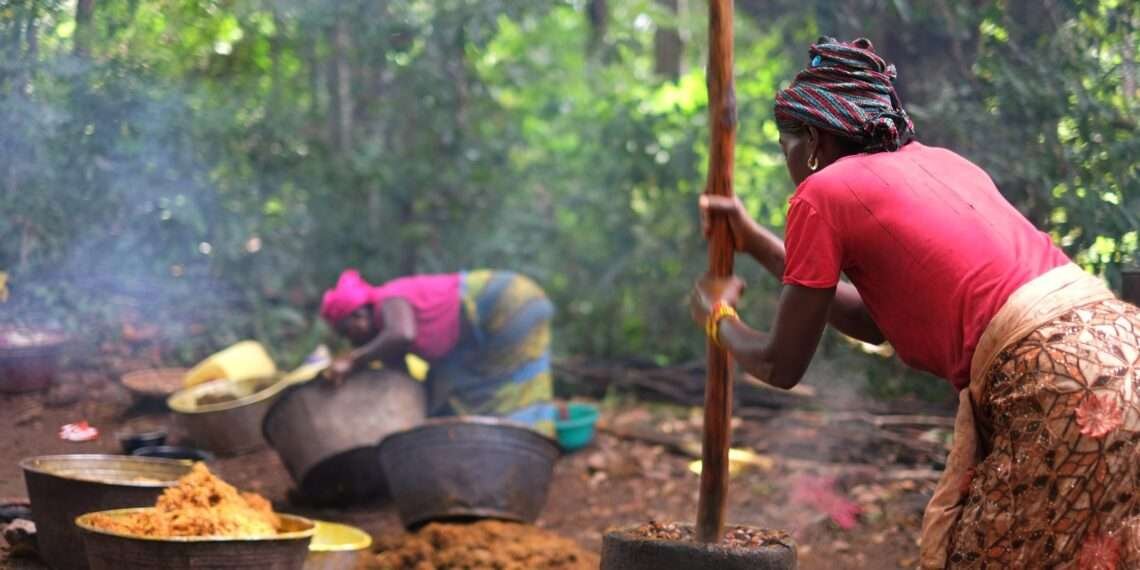In a joint operation with the Oil Palm Development Association of Ghana and the Tree Crop Development Authority, Mr. Paul Amaning, President of the Artisanal Palm Oil Millers and Out growers Association of Ghana, has intensified efforts to eliminate fake oil from the Ghanaian market.
According to Amaning, the operation is part of a nationwide exercise aimed at stopping the smuggling of unapproved vegetable oil into the country.
The government has mandated that all imported vegetable oils must pass through Tema and Takoradi ports, with vegetable oils crossing land borders being declared illegal.
“I was so surprised not to see one made in Ghana vegetable oil, which tells that the market is flooded with smuggled oil which is very bad. The security agencies and Customs have to sit up. I can tell you frankly that they are not doing their job at all. Some of these oils are not meant for consumption, they are for soap production, that is what we want Ghanaians to know.”
Mr. Paul Amaning
Paul Amaning, the coordinator of the task force who led the operations, explained that a government directive since November 2023 mandated all imported vegetable oils to pass through both Tema and Takoradi ports.
Mr. Paul Amaning expressed concern over the prevalence of smuggling, explaining that it constituted a threat to over 8,000 jobs made up of farmers, millers, producers, and manufacturers.
He emphasized that only four brands; Kings Oil, Frytol, Hayat, and Golden Drop – are legal and approved for consumption in Ghana.
However, during the operation across Kasoa, Mallam Market, and Adabraka in Accra, none of these approved brands were found, indicating a significant influx of smuggled oils in the market.
“Eight shops were closed at the end of the day and their owners would be handed over to Ghana Revenue Authority (GRA) for legal action,” Mr Amaning stated.
Mr. Paul Amaning urged Ghanaians to be vigilant and avoid consuming smuggled vegetable oils, cautioning that some of these oils may not be fit for consumption and could pose health risks.
Illicit Importation of Oil Killing Local Industry
Earlier this year, the Oil Palm Development Association of Ghana (OPDAG) sounded the alarm over the rampant smuggling of vegetable oil into the country, a development that not only undermines local production but also jeopardizes the jobs of nearly 860,000 individuals linked to the industry.
The association noted that local producers reel from losing over 600,000 metric tonnes of vegetable oil production monthly, and the nation stands at a critical juncture, caught between the need to safeguard its local industries and the challenges of tackling illicit trade.
The Oil Palm Development Association of Ghana (OPDAG) highlighted that the smuggling of vegetable oil through unapproved routes into Ghana poses a significant threat to the oil palm industry, an essential pillar of the country’s economy.
“We appeal to key stakeholders including the Ministry of Finance, the Ministry of Trade & Industry, Ministry of Food & Agriculture, the General Agricultural Workers Union (GAWU), and the Association of Ghana Industries (AGI) to do every legitimate thing within their respective mandates not only to save the local palm oil industry/value chain but more importantly to create the enabling environment for it to grow and to prosper.”
Mr Samuel Avaala
The President of the Oil Palm Development Association of Ghana (OPDAG), Mr Samuel Avaala stated, “A clear indication that the local manufacturing companies have even twice the ability to cater for local demand and also some ECOWAS markets through exports. This can contribute to the foreign exchange earnings of the country.”
READ ALSO: Akosombo Dam Flood Victims Left in the Shadows, MDA Alleges





















